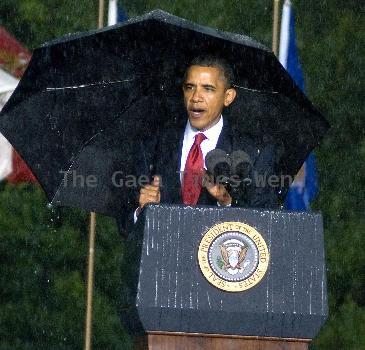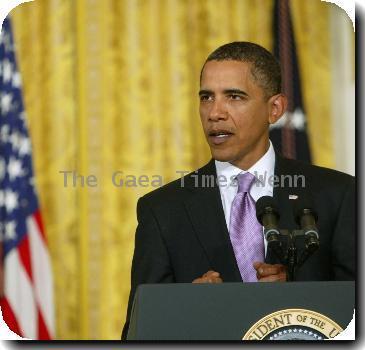Gulf oil spill forces choice between environment and economy; not enough booms to go around
By Matt Sedensky, APThursday, June 3, 2010
BP spill forces choice between ecology and economy
GULF SHORES, Ala. — Forced to perform a painful kind of environmental triage, emergency workers concentrated on protecting marshes and inlets from the approaching BP oil slick Thursday and left one of the Gulf Coast’s biggest tourist attractions — its white-sand beaches — largely undefended.
As BP struggled a mile underwater to cut and cap the blown-out well, the decision to sacrifice parts of the shoreline — made weeks ago by state and Coast Guard officials — came under fire from Alabama’s governor.
“We could lose an entire tourist season because of this. It would be absolutely devastating,” Gov. Bob Riley said in an interview with The Associated Press. The state’s two coastal counties deliver 35 percent of its tourism dollars, mostly spending by beachgoers.
In deciding to put the marshes first, emergency officials reasoned that they had enough time and containment boom to shield the Gulf’s fragile ecology or its endangered economy, but not both. Also, they argued that beaches will be easier to clean, as well as harder to protect because of the action of the waves against the floating barriers.
The strategy pits environmentalists against the tourism industry, and also casts doubt on repeated promises by the Obama administration to bring to bear whatever resources are necessary to battle the spill.
The no-win decision left Gulf residents and visitors with an aching sadness and a sense of futility, knowing that the first fingers of the slick were only miles away.
“The reason I’m here now is because I’m afraid it’s going to be gone,” said Mark Johnecheck, a retired Navy captain, as he watched the surf crash ashore at Pensacola Beach, Fla. “I don’t know what else they can do. It just makes you feel helpless.”
Meanwhile, BP struggled to contain the flow, slicing off the bent well pipe with giant shears Thursday after a diamond-tipped saw got stuck halfway through the job. Later, a robotic arm was able to place a cap over the gusher. Still, live video showed a strong stream of oil spewing.
Getting the cap in place could prove difficult. The cut was jagged and means it won’t fit as snugly as officials hoped.
“We’ll have to see when we get the containment cap on it just how effective it is,” said Coast Guard Adm. Thad Allen, the government’s point man for the disaster. “It will be a test-and-adapt phase as we move ahead, but it’s a significant step forward.”
The next best hope for stopping the flow is two relief wells that are now being dug. But they won’t be finished until August.
Anywhere between 21 million and 46 million gallons of oil has spewed into the Gulf, according to government estimates.
BP CEO Tony Hayward promised Thursday that the company would clean up every drop of oil and “restore the shoreline to its original state.”
“BP will be here for a very long time. We realize this is just the beginning,” he said.
On shore, the swirling, multicolored sheen of oil was reported to be within four miles of the Panhandle coast.
“Our whole lives are intertwined with the river and the bay. Our oysters are what we depend on,” said Anita Grove, executive director of the Apalachicola Bay Chamber of Commerce. “It’s a frightening thing to all of us because our livelihoods, anywhere in Florida pretty much, depend on the water.”
Oil washed ashore on the eastern side of Mobile Bay at Alabama’s Fort Morgan, which Confederate forces used to bombard Union ships during the Civil War. The white-sand beach in front of the historic structure was littered with gooey brown globs of oil. Dark patches of what appeared to be oil hung in the surf.
The Florida Department of Environmental Protection said that more a quarter-million feet of boom has been placed along the most sensitive areas of the Panhandle.
P.C. Wu, a city councilman in Pensacola, said political leaders faced a difficult decision. Ultimately, he said, they decided trying to keep oil from entering marshes — where it could kill sea grasses and move inland — was a more realistic and fruitful choice than trying to prevent it from washing onto beaches.
“If it hits the beach, the beach will probably be the easiest thing to clean up,” he said. “But if it hits the grass, it automatically starts killing all the grass.”
The estuaries also have calmer waters, Wu said, where booms are more effective. “I don’t know how effective the booms would be out at the beach with the wave actions,” he said.
Laura Lee, a spokeswoman for the Pensacola Bay Area Convention and Visitors Bureau, said tourist officials were confident local leaders have done all they can to minimize the effects of the oil.
“I think everybody here is pretty frustrated that the oil has not been shut off, and that’s got to happen first,” she said.
Karen Bjorndal, director of the Archie Carr Center for Sea Turtle Research at the University of Florida, said she would protect marshes and inlets first because they harbor a richer diversity of life than the beaches. Also, she said marshes serve as nurseries for the Gulf, supplying nutrients that are key to the undersea foodchain and harboring creatures that spend their earliest weeks in marshes before heading to open water.
But she admitted: “It very much is a Solomon’s choice.”
The damage to the environment was chillingly evident Thursday on East Grand Terre Island along the Louisiana coast, where workers found birds coated in thick, black goo. Images shot by an Associated Press photographer show Brown pelicans drenched in thick oil, struggling and flailing in the surf.
The latest attempt to control the spill was considered risky because slicing away a section of the 20-inch-wide riser removed a kink in the pipe, and that could temporarily increase the flow of oil by as much as 20 percent. But once the cut was completed, Allen said it was not immediately clear whether the flow had increased.
President Barack Obama will return to the Louisiana coast Friday to assess the latest efforts, his third trip to the region since the disaster unfolded April 20 with an explosion that killed 11 workers aboard an offshore drilling rig. It will be the president’s second visit in a week.
The White House said the government is sending BP a $69 million bill for the costs of the spill so far.
Jay Reeves reported from Gulf Shores and Matt Sedensky from Pensacola Beach, Fla. Associated Press writers Adam Geller, Cain Burdeau and Janet McConnaughey in New Orleans; Greg Bluestein in Metairie, La.; Melissa Nelson in Pensacola Beach; and Paul J. Weber in Houston contributed to this story.
Tags: Accidents, Alabama, Barack Obama, Coastlines And Beaches, Cut and cap, Environmental Concerns, Florida, Gulf Shores, Louisiana, North America, Pensacola, United States






